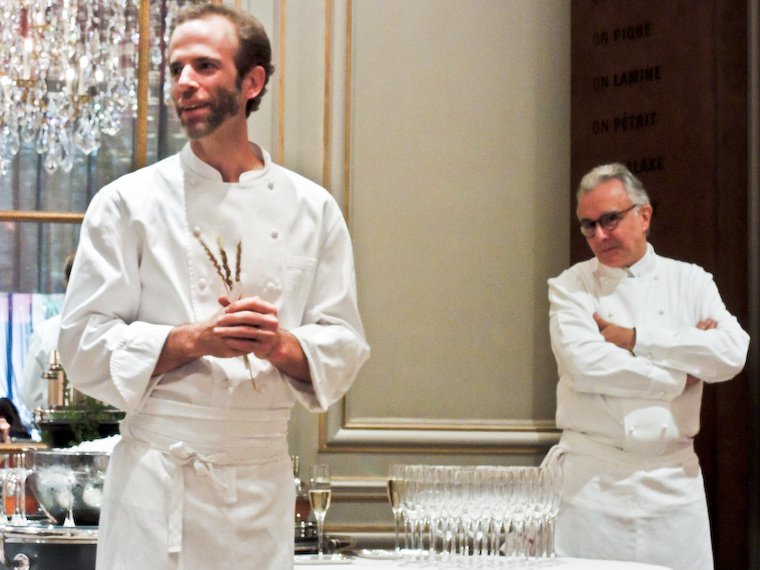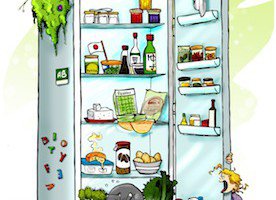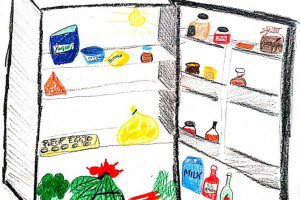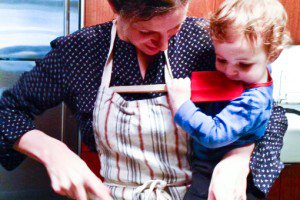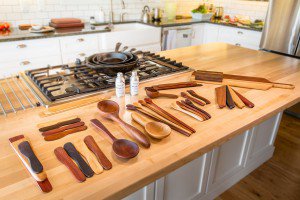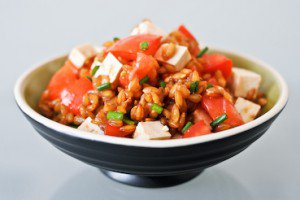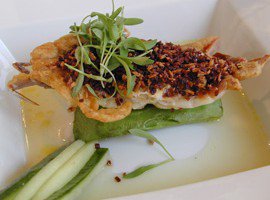For this new installment of our Draw Me A Fridge series (read about it here), we spoke with Dan Barber.
Dan Barber is the chef behind one of my all-time favorite restaurants, Blue Hill, in NYC’s Greenwich Village, and a farm-restaurant upstate, Blue Hill at Stone Barns, to which I’ve been longing to go for years. He is one of the most prominent chefs in the US, he’s an active participant in the discussion on ethics and sustainability, and he works with food and ideas with equal talent.
I recently had the opportunity to meet him in Paris, where he had been invited by Alain Ducasse to cook a special lunch at the Plaza Athénée hotel. Alexia Colson-Duparchy, who runs the Draw Me A Fridge series on Chocolate & Zucchini, joined me, and we talked about breeding, spoons, and fried eggs, among other things.
Lately I’ve been devoting a lot of my time to breeding. It’s not genetic engineering, it’s natural selection done with modern technology to make it go very fast, so that you get to where you want to go in two years as opposed to a hundred years.
Many chefs and people who love food want to go back to old seeds, the so-called heirlooms. But what’s interesting to me is how we can use some of the genetics from the past and help move it to the future. Heirlooms mean you stop at a particular moment in time: somebody says, that’s a great tomato, okay, we stop, and we’re going to pass down the seeds. It may be a fantastic tomato, but I think we can do better. I know we can do better. You have to use these genetics and those breeders who help us concentrate on flavor and disease resistance. It’s very important for farmers.
Tomorrow’s lunch is about that idea. We brought ingredients for each course. Wheat is a big one for me, because I’m working with a wheat breeder very closely. There will also be celtuse, a type of lettuce. We worked with a breeder on it and we planted it in dust from hazelnuts. The celtuse took some of the flavors from the hazelnut. It’s great.
Usually I use local ingredients, but I feel the theme of this lunch is more important.
On to the fridge! What are your staples?
I live in a small apartment and my home fridge is this big [he shows a tiny drawer in the table we’re sitting at]. It’s one third the size of a regular American fridge; probably half the size of a Parisian fridge.
We don’t keep much in there because of the size, but there’s always yogurt, and Blue Hill Farm milk. We always have some type of seasonal fruit: berries in the summer, apples in the fall. I keep apples in the fridge because I like to eat them cold. The fruit is not organic, because it’s local, and nothing local grows organic fruit-wise. That’s why we want to work with breeders to find a way to do it, but it’s hard, very hard.
There’s peanut butter in there as well, and my wife loves marmalades, so we have marmalade in there. We have eggs, too: we run a farm, so we have eggs all year long.
Do you handle the grocery shopping for your household yourself?
My wife* shops at the farmers market, but the fridge is so small we don’t keep many things around. I bring things back from the restaurant, though probably not enough. In truth, we don’t eat at home a lot: I have two restaurants, and I am five days a week at Stone Barns, and two days a week in New York, so I’m usually working at night.
What is the most surprising thing about your fridge?
For Americans, it’s by far the size. Aside from that, the most surprising thing is probably that we don’t have pre-cooked food at all. When my wife cooks she does something quick for herself, and then it’s never stored. If I’m home I try and cook, but it’s the same thing with me, I do something very quickly.
Any cooking disaster that you would like to share?
Ah, yes, you like the disasters! You know, my room for disaster is very small because everything is so simple and we never have guests. We just really love to be with each other when we are. We have friends, and if we go out, we go out with friends, but it’s very rare. We enjoy seeing each other. So what’s a disaster between two people? We’re not cooking for dinner parties or for a big family.
But the disaster is when I have chocolate or sweets. That becomes a disaster because I can’t stop. My wife is a great baker, she’s always baking cookies for friends, and if I get home at one o’clock in the morning, I’m always… [He mimes “chomp, chomp.”]
What is your favorite cooking tool?
A spoon. I have a particular type of spoon in both kitchens, and I don’t let anyone use any other spoons. It’s an oversized soup spoon with a pretty shallow bowl, so it’s like a hybrid between a spoon and a spatula. I get it in bulk and I use it for everything: stirring, flipping fish, and then I’m always tasting. I always have all the cooks taste what we’re cooking, and I want the same spoon so everyone’s tasting the same way. I feel like a different size spoon affects the way you taste a lot, because it affects how much you put in your mouth.
[We ask if he brought the spoons to Paris.] You know, it’s funny. They were on the list, but one of the guys who was packing was a new cook, and he thought somebody made a mistake putting it on the list, so he crossed it out, thinking, “They’ll have spoons in Paris!” But I’m sure I’ll be more than satisfied with the spoons they have here.
And the most useless gadget you own?
The tray of madeleines I bought here at Dehillerin when I was twenty-five. I haven’t used those yet. Ever.
Any recipe you could suggest to our readers for when there’s hardly anything left in the fridge?
My favorite would be to do a fried egg with a stew of scraps. If I’m lucky, I’ll bring something from the restaurant that’s a purée, maybe some type of lettuce purée. I’ll sauté scraps of old vegetables, all cut very small, in a skillet, then put in a little bit of water and this purée, and all of a sudden you have this beautiful peasant potage. Add some lemon juice or cherry vinegar, and then the fried egg on top.
[We ask about tips on frying an egg.] I have a lot of tips! First, you need fat. In the restaurant, we use pork fat, so I’m pretty particular about that. It’s from the farm, and it’s actually bacon fat, which is seasoned, so it seasons the egg. I feel very strongly about caramelizing the whites very hard. I use a non-stick pan for that. One way is to layer the whole bottom of your pan in a lot of fine sea salt and to crack the egg right over the salt: that way you will caramelize your whites in salt. Cook it for a long time on one side. Never flip it. And I don’t pour fat over the egg. I’m sure it’s delicious, but I really like the idea that the egg is just set. If you get the temperature right — I do it pretty high heat — and you have a fresh egg, the whites cloud around the yolk and I love that. I don’t want to ruin it.
What are you up to these days?
I’m spending most of my time thinking about the breeding, and my book. It’s now done, almost. It’s scheduled for either summer or fall 2013. I wrote it myself and it took me five years. There is no title yet, but it’s with Ann Godoff at Penguin Press.
It won’t really be a recipe book or a book about Blue Hill Farm, though it’s there. It’s more about meetings and interactions with other farmers and breeders, the story of how I got to this idea of breeding. It’s a book about all these different, great characters. Half of the book takes place in Spain, because I met this great foie gras guy, Eduardo (Eduardo Sousa), so he’s going to be a big part of the book. And Miguel (Miguel Medialdea), too, another guy who does fish. [You can also view Barber’s two TED talks about foie gras and fish.]
The whole last part of the book is about wheat and breeding, and how we breed whole wheat for real, true, great flavor — the breeder is actually going to call this new variety Barber wheat. I’ve learned all about gluten molecules, high-protein wheat and how we’ve completely changed wheat overnight. No wonder we all have these problems! Overnight, we went from wheat this tall to wheat this tall [gestures from big to small] and from protein this much to this much [gestures from small to big] and our bodies did not have time to evolve, it’s obvious. And it’s just bad flavor. It’s incredible and I don’t think it’s being talked about with any clarity.
* Dan Barber’s wife is novelist Aria Beth Sloss, author of the upcoming novel, Autobiography of Us.


